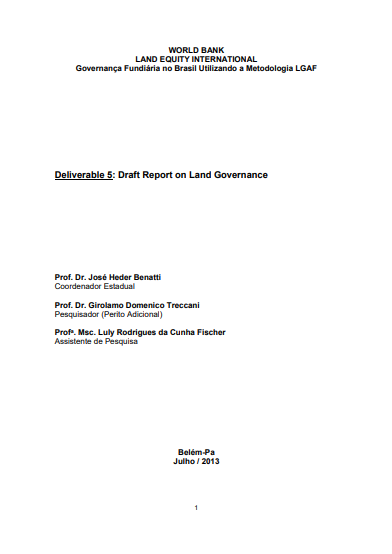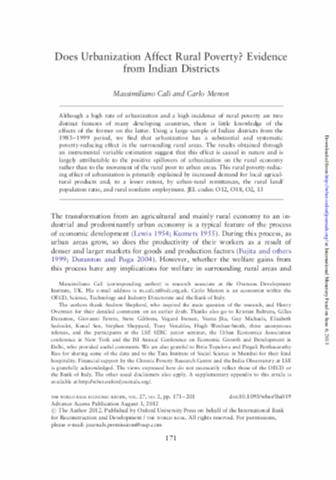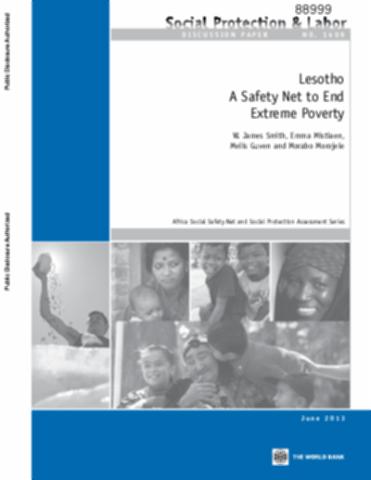The World Bank is a vital source of financial and technical assistance to developing countries around the world. We are not a bank in the ordinary sense but a unique partnership to reduce poverty and support development. The World Bank Group has two ambitious goals: End extreme poverty within a generation and boost shared prosperity.
- To end extreme poverty, the Bank's goal is to decrease the percentage of people living on less than $1.25 a day to no more than 3% by 2030.
- To promote shared prosperity, the goal is to promote income growth of the bottom 40% of the population in each country.
The World Bank Group comprises five institutions managed by their member countries.
The World Bank Group and Land: Working to protect the rights of existing land users and to help secure benefits for smallholder farmers
The World Bank (IBRD and IDA) interacts primarily with governments to increase agricultural productivity, strengthen land tenure policies and improve land governance. More than 90% of the World Bank’s agriculture portfolio focuses on the productivity and access to markets by small holder farmers. Ten percent of our projects focus on the governance of land tenure.
Similarly, investments by the International Finance Corporation (IFC), the World Bank Group’s private sector arm, including those in larger scale enterprises, overwhelmingly support smallholder farmers through improved access to finance, inputs and markets, and as direct suppliers. IFC invests in environmentally and socially sustainable private enterprises in all parts of the value chain (inputs such as irrigation and fertilizers, primary production, processing, transport and storage, traders, and risk management facilities including weather/crop insurance, warehouse financing, etc
For more information, visit the World Bank Group and land and food security (https://www.worldbank.org/en/topic/agriculture/brief/land-and-food-security1
Resources
Displaying 2496 - 2500 of 4907The Socialist Republic of Vietnam : Coffee Sector Report
Vietnam has experienced three sets of
direct impacts as a result of the coffee crisis: Some
regional economic shocks, socio-economic impacts in the
primary coffee-producing regions that have resulted in the
partial dismantling of services like health-care and
education; and post-crisis changes in the business
environment. This study of the Vietnamese coffee sector is
divided into seven parts. Part 1 provides an overview of the
Governança Fundiária no Brasil Utilizando a Metodologia LGAF
Governança Fundiária no Brasil Utilizando a Metodologia LGAF
Does Urbanization Affect Rural Poverty? Evidence from Indian Districts
Although a high rate of urbanization and a high incidence of rural poverty are two distinct features of many developing countries, there is little knowledge of the effects of the former on the latter. Using a large sample of Indian districts from the 1983–1999 period, we find that urbanization has a substantial and systematic poverty-reducing effect in the surrounding rural areas.
Lesotho : A Safety Net to End Extreme Poverty
This report shows that while more inclusive growth is the ultimate solution to poverty in Lesotho, the country can and should use selective social transfers to reduce poverty more rapidly among the extreme poor. But because the majority of the transfers are received by people who are not among the extreme poor there is room for increasing the efficiency and effectiveness of spending on safety nets which. These programs should be productive and concentrate on the extreme poor Basotho.
Incidence and Impact of Land Conflict in Uganda
While there is a large, though
inconclusive, literature on the impact of land titles in
Africa, little attention has been devoted to the study of
land conflict, despite evidence on increasing incidence of
such conflicts. The authors use data from Uganda to explore
who is affected by land conflicts, whether recent legal
changes have helped to reduce their incidence, and to assess
their impact on productivity. Results indicate that









